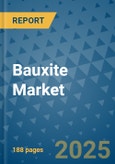Market Insights: Shift Toward Sustainable and Efficient Practices
Stricter environmental regulations from 2024 onward are compelling companies to adopt low-carbon technologies and more efficient waste management solutions. A notable trend in the industry is the rapid adoption of innovative beneficiation techniques aimed at boosting bauxite recovery rates and reducing environmental impact.By 2032, recycled aluminum is projected to account for 30% to 40% of total global aluminum production. This shift will reduce reliance on newly mined bauxite while sustaining strong demand for metallurgical-grade bauxite, which is expected to command an 86.1% market share in 2024 due to its essential role in alumina production through the Bayer process.
Key Growth Drivers
Urbanization and Infrastructure Development
By 2032, an estimated 60% of the global population will live in urban areas. This urbanization is driving demand for infrastructure such as housing, roads, mass transit, and energy systems. As a result, aluminum - sourced from bauxite - is increasingly used in building materials, electric vehicles (EVs), and energy grids. In Asia Pacific, these dynamics are particularly pronounced due to ongoing industrial expansion and strategic infrastructure investments.Growth of Secondary Aluminum and Recycling
Aluminum’s recyclability is proving crucial in reducing the industry’s carbon footprint. Recycling aluminum consumes only 5% of the energy required for primary production and has been a cornerstone in reducing environmental impact. In the U.S., 50% of aluminum is recycled, while Europe recycles 75% of aluminum cans - figures that continue to rise.Emerging Business Opportunities
The need to reduce the environmental impact of bauxite mining is fostering demand for sustainable and green mining practices. Companies are investing in land reclamation, biodiversity restoration, and waste management, responding to both public pressure and regulatory mandates. For instance, the World Bank and other institutions now emphasize sustainability metrics in mining project evaluations.Moreover, emerging technologies like AI, big data, and IoT are transforming mining operations, optimizing efficiency, and lowering costs while enhancing worker safety and environmental compliance.
Regional Analysis
Asia Pacific: A Dominant Force
Asia Pacific will continue to dominate the bauxite market, projected to hold 82.2% of the global share in 2024. China, as the world’s top aluminum producer, accounted for 60% of global output in 2022 and imported 125 million metric tons of bauxite - with Guinea providing 66 million metric tons alone. India is also ramping up its production capacity, aided by national programs like the National Infrastructure Pipeline (NIP) and Make in India.Europe: A Sustainability-Driven Market
Europe relies heavily on bauxite imports due to minimal domestic reserves. The continent’s focus on green transitions - exemplified by the European Green Deal - is fueling demand for recycled aluminum and eco-efficient refining techniques. The automotive sector, in particular, continues to be a stronghold for aluminum use in lightweight vehicle manufacturing.North America: Innovation and Import Dependency
North America, especially the U.S. and Canada, remains largely dependent on bauxite imports, sourcing from Brazil, Guinea, and Australia. While Canada is a leading aluminum exporter, domestic bauxite reserves are negligible. However, innovations like Brimstone’s carbon-free alumina from calcium silicate could redefine the region’s alumina production landscape.Key Players and Strategic Developments
Leading companies are embracing vertical integration and strategic partnerships to gain control over the entire bauxite-aluminum value chain. Noteworthy strategic moves include:
- Rio Tinto announced expanded R&D for gallium extraction from bauxite in Canada (Dec 2024).
- Australasian Metals Limited confirmed a significant gallium discovery in its bauxite project (Dec 2024).
- Arrow Minerals revealed mineralization from its Nigerian drilling efforts (Nov 2024).
Major Players in the Market Include:
- Alcoa Corporation
- Rio Tinto
- Aluminum Corporation of China Limited (CHALCO)
- Norsk Hydro ASA
- South32
- RusAL
- NALCO India
- Hindalco Industries Ltd.
- Emirates Global Aluminum PJSC
- Maaden
- PT ANTAM Tbk
- Ashapura Minechem Ltd
- Jamalco
- Vedanta Resources
- Bosai Minerals Group
Global Bauxite Market Segmentation
By Grade Type
- Metallurgical-grade
- Refractory-grade
- Other Grade
By Application
- Alumina Production
- Refractory
- Cement
- Other
By Region
- North America
- Europe
- Asia Pacific
- Latin America
- Middle East & Africa
This product will be delivered within 1-3 business days.
Table of Contents
Companies Mentioned
- Alcoa Corporation
- Rio Tinto
- Aluminum Corporation of China Limited (CHALCO)
- Norsk Hydro ASA
- South32
- RusAL
- NALCO India
- Hindalco Industries Ltd.
- Emirates Global Aluminum PJSC
- Maaden
- PT ANTAM Tbk
- Ashapura Minechem Ltd
- Jamalco
- Vedanta Resources
- Bosai Minerals Group








